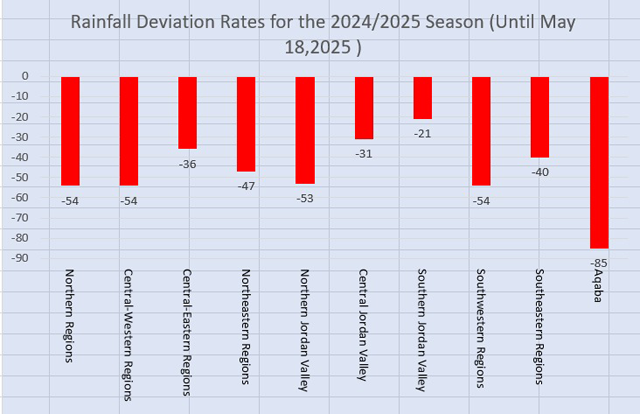You are here
Rainfall season falls short of averages – JMD
By JT - May 19,2025 - Last updated at May 19,2025

Jordan Meteorological Department Director Raed Khattab on Monday says that the season had officially been classified as weak nationwide, with precipitation levels ranging from 15 per cent to 79 per cent of the seasonal average (JMD photo)
AMMAN — The current rainfall season is falling “significantly” below annual averages across the Kingdom, prompting concerns about its impact on water and agricultural sectors, according to the Jordan Meteorological Department (JMD).
JMD Director Raed Khattab on Monday said that the season had officially been classified as weak nationwide, with precipitation levels ranging from 15 per cent to 79 per cent of the seasonal average, depending on the area.
The southern Jordan Valley has performed the strongest so far, receiving 79 per cent of its average annual rainfall.
In contrast, the port city of Aqaba reported the weakest rainfall, with only 15 per cent of its usual total.
The highest cumulative rainfall was recorded at the Ras Muneef station, measuring 303.3 millimetres (mm), representing 52 per cent of its seasonal norm.
The JMD figures showed that rainfall levels varied across the Kingdom, with the northern region receiving 187.5mm, or 54 per cent of the seasonal average.
The west-central region received 193.5mm, also 54 per cent, while the east-central region recorded 78.9mm, representing 36 per cent.
The eastern region saw a total of 49.5mm, amounting to 47 per cent of its seasonal norm, while the northern Jordan Valley recorded 163.9mm, or 53 per cent, and the central valley received 188.8mm, equivalent to 31 per cent.
The southern Jordan Valley received 57.7mm, reaching 79 per cent of its average.
Meanwhile, the southwestern region recorded 108.1mm, or 54 per cent, and the southeastern region received 33.2mm, or 40 per cent.
The lowest amount was registered in Aqaba at the King Hussein International Airport, with just 3.4mm, some 15 per cent of the seasonal average.
Khattab warned that continued shortfalls in downpour pose risks to water availability and agricultural productivity.
He urged the public to consume water more responsibly, stressing the need to prepare for the effects of reduced precipitation.
















